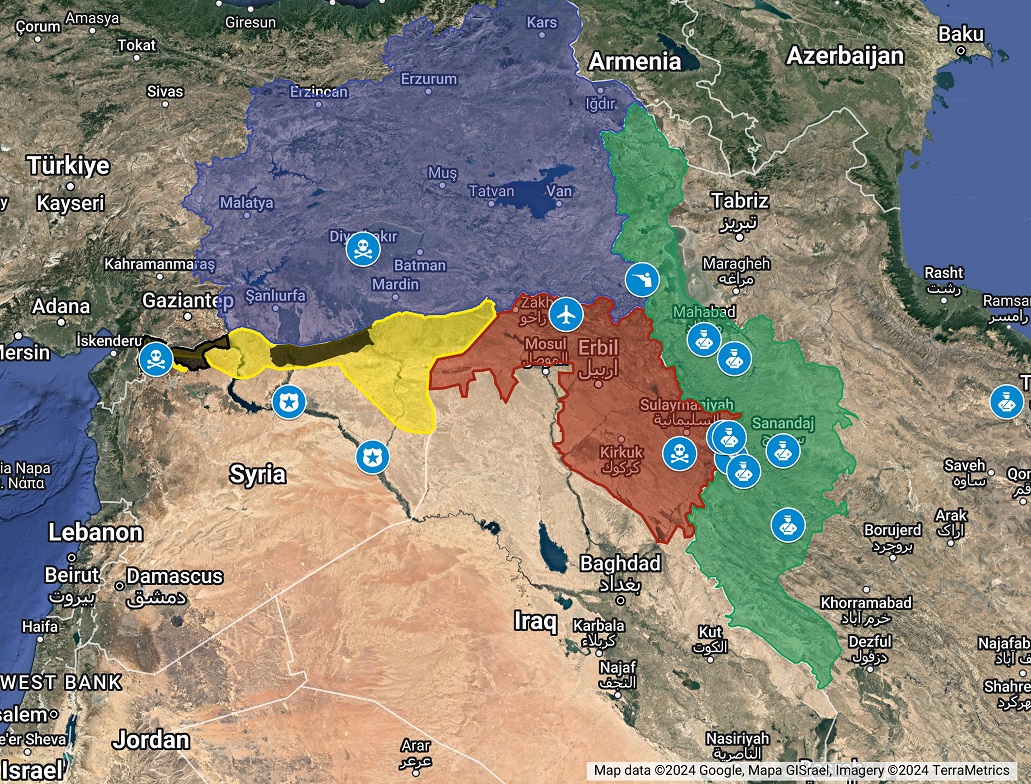1.3K
A Digest of Events in the Kurdistan Regions of Iran, Iraq, Syria, and Turkey.
Iran
- The Iranian regime’s crackdown on Kurdish dissidents continues, including the arrest of Omid Faraji, a Kurdish man from Ney village in Marivan, who was lured to a local bank by Iranian security agencies and detained upon arrival. Recently, security forces have been summoning and interrogating residents of Ney village, including minors, instilling fear in the community. Simultaneously, security forces arrested two Kurdish men in Piranshahr, eight Kurdish environmental activists in Kermanshah, a woman activist in Pahev, a religious activist and a woman in Bokan, and three Kurds in Mehabad, including a child. Additionally, several activists were sentenced to lengthy prison terms, including eight years for the father of an executed protester and three years and six months for a civilian activist in Senna. Separately, the Hengaw Organization for Human Rights reported the torture of four Kurdish border porters (kolbar) by Iranian border guards, who were subsequently shot with pellet guns. Meanwhile, two kolbars were killed by Iranian authorities in Urmia and Baneh.
Iraq
- On August 18, Iraqi border guards near the Hawraman region killed a local kolbar attempting to cross the Iran-Iraq border. In response, angry locals protested the violence by burning down a border post. The spokesperson for the Iraqi border guards told Rudaw that one of their personnel was injured during the demonstration. The victim, 26-year-old Sazgar Salah, was the sole provider for his siblings following the death of their parents. In March 2023, Iraq and Iran signed a security agreement that included disarming Iranian Kurdish opposition parties in Iraqi Kurdistan and cracking down on Kurdish kolbars as part of their border security measures.
- A recent report by Community Peacemaker Teams (CPT) highlighted the severe impact of Turkish and Iranian military operations on civilians in Iraqi Kurdistan between 1991 and 2024. The operations, intended to target Kurdish opposition groups, have resulted in significant civilian harm in the Kurdistan Region. The report documented 845 civilian casualties, including 425 deaths and 420 injuries, with Turkey responsible for 83% of these casualties and Iran for 17%. Since 2017, Turkish military actions have intensified, leading to widespread displacement and economic disruption, with children comprising 28% of the victims. Iran’s military activities have similarly caused deaths, injuries, and displacement, primarily through bombardments. Despite existing laws requiring compensation, the Iraqi government has largely failed to support affected civilians, leaving many without aid, according to CPT.
- Two members of the Asayish security forces were killed in a shooting by ISIS (Da’esh) in the Qaradagh district of Sulaimani province. The incident occurred in the Qopi Qaradagh Valley, known for its archaeological sites. The area is in close proximity to the disputed territories, where the terrorist group has been reorganizing.
Syria
- The Kurdish-led Syrian Democratic Forces (SDF) announced a “large-scale” retaliatory operation against the Syrian regime and its militias in Deir Ez Zor, targeting regime forces on the western bank of the Euphrates River. This action follows the August 7 artillery bombardment by regime forces that killed eleven people, including four children, an infant, and two women. The SDF also reported losing two of its members, with eight others wounded. In response, the SDF stated that they had raided three villages used as launching points for attacks on the villages of al-Dahalah and Jadeed Bakara. Separately, the U.S. reaffirmed its presence in Syria for the “enduring defeat of ISIS,” according to Pentagon Press Secretary Maj. Gen. Pat Ryder. “The SDF have been good partners in that fight, essential partners in that fight, and that continues to be the basis for our relationship and our cooperation with the SDF,” said Maj. Gen Ryder. Recently, the SDF announced the elimination of several terrorists and the arrest of five others.
- The ongoing demographic changes in the Kurdish city of Afrin continue under Turkish occupation. The Syrian Observatory for Human Rights (SOHR) reported that the Pakistan “Flood Relief” organization, in collaboration with the Turkish Diyanet Foundation, has established a new residential complex called “Al-Madinah Village” in the Kar Roum village of Afrin. The project, facilitated by Turkish-backed Sultan Murad militants, involved clearing forested land and includes 84 housing units, along with mosques and schools, to accommodate families of pro-Turkey faction fighters from Homs. On March 25, the Turkish organization “White Hands” unveiled another complex with 80 apartments in Shaderah village in occupied Afrin.
Turkey
- The police in Istanbul raided a Kurdish wedding in the Esenyurt district, arresting eight people, including the hosts and musicians for playing “political songs.” Five detainees were released after questioning, while three remain in custody facing charges of “making terrorist propaganda.” The pro-Kurdish Peoples’ Equality and Democracy Party (DEM) condemned the raid as an act of intolerance toward Kurdish identity and culture, noting a rise in similar police actions against Kurdish weddings across Turkey in recent months. The DEM Party spokesperson Ayşegül Doğan stated, “The current government no longer hides its hostility toward Kurds, which we have long pointed out. It feels no need to conceal this hostility. Those in power are now trying to subject even Kurdish weddings to the approval of civil authorities. This coincided with other hate crimes in the Kurdish provinces of Van and Diyarbakir (Amed), where unidentified individuals vandalized Kurdish-written traffic signs, replacing them with the slogan “Turkey is Turkish and will remain Turkish.”

